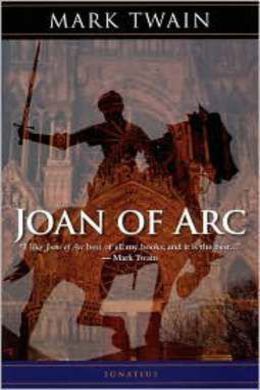
Joan of Arc - Volume 1
Personal Recollections of Joan of Arc by the Sieur Louis de Conte
by Mark Twain
subjects: Historical Fiction
-
EPUB 285 KB
-
Kindle 344 KB
-
Support epubBooks by making a small $2.99 PayPal donation purchase.
Description
In 1429, a 17-year-old peasant girl receives a message from Heaven that she is to rescue France from its English oppressors. Within two years this most unlikely of heroines leads a ragtag army to victory, sees the king crowned, and dies at the stake, martyred by traitors. America’s most famous storyteller, Mark Twain, was obsessed with the story of Joan of Arc, and labored 12 years to tell it in this novel, which he considered his masterpiece.
317 pages with a reading time of ~5 hours (79250 words), and first published in 1896. This DRM-Free edition published by epubBooks, 2009.
Community Reviews
There are currently no other reviews for this book.
Excerpt
I, the Sieur Louis De Conte, was born in Neufchateau, on the 6th of January, 1410; that is to say, exactly two years before Joan of Arc was born in Domremy. My family had fled to those distant regions from the neighborhood of Paris in the first years of the century. In politics they were Armagnacs—patriots; they were for our own French King, crazy and impotent as he was. The Burgundian party, who were for the English, had stripped them, and done it well. They took everything but my father’s small nobility, and when he reached Neufchateau he reached it in poverty and with a broken spirit. But the political atmosphere there was the sort he liked, and that was something. He came to a region of comparative quiet; he left behind him a region peopled with furies, madmen, devils, where slaughter was a daily pastime and no man’s life safe for a moment. In Paris, mobs roared through the streets nightly, sacking, burning, killing, unmolested, uninterrupted. The sun rose upon wrecked and smoking buildings, and upon mutilated corpses lying here, there, and yonder about the streets, just as they fell, and stripped naked by thieves, the unholy gleaners after the mob. None had the courage to gather these dead for burial; they were left there to rot and create plagues.
And plagues they did create. Epidemics swept away the people like flies, and the burials were conducted secretly and by night, for public funerals were not allowed, lest the revelation of the magnitude of the plague’s work unman the people and plunge them into despair. Then came, finally, the bitterest winter which had visited France in five hundred years. Famine, pestilence, slaughter, ice, snow—Paris had all these at once. The dead lay in heaps about the streets, and wolves entered the city in daylight and devoured them.
Ah, France had fallen low—so low! For more than three quarters of a century the English fangs had been bedded in her flesh, and so cowed had her armies become by ceaseless rout and defeat that it was said and accepted that the mere sight of an English army was sufficient to put a French one to flight.
When I was five years old the prodigious disaster of Agincourt fell upon France; and although the English King went home to enjoy his glory, he left the country prostrate and a prey to roving bands of Free Companions in the service of the Burgundian party, and one of these bands came raiding through Neufchateau one night, and by the light of our burning roof-thatch I saw all that were dear to me in this world (save an elder brother, your ancestor, left behind with the court) butchered while they begged for mercy, and heard the butchers laugh at their prayers and mimic their pleadings. I was overlooked, and escaped without hurt. When the savages were gone I crept out and cried the night away watching the burning houses; and I was all alone, except for the company of the dead and the wounded, for the rest had taken flight and hidden themselves.
I was sent to Domremy, to the priest, whose housekeeper became a loving mother to me. The priest, in the course of time, taught me to read and write, and he and I were the only persons in the village who possessed this learning.
At the time that the house of this good priest, Guillaume Fronte, became my home, I was six years old. We lived close by the village church, and the small garden of Joan’s parents was behind the church. As to that family there were Jacques d’Arc the father, his wife Isabel Romee; three sons—Jacques, ten years old, Pierre, eight, and Jean, seven; Joan, four, and her baby sister Catherine, about a year old. I had these children for playmates from the beginning. I had some other playmates besides—particularly four boys: Pierre Morel, Etienne Roze, Noel Rainguesson, and Edmond Aubrey, whose father was maire at that time; also two girls, about Joan’s age, who by and by became her favorites; one was named Haumetter, the other was called Little Mengette. These girls were common peasant children, like Joan herself. When they grew up, both married common laborers. Their estate was lowly enough, you see; yet a time came, many years after, when no passing stranger, howsoever great he might be, failed to go and pay his reverence to those two humble old women who had been honored in their youth by the friendship of Joan of Arc.
